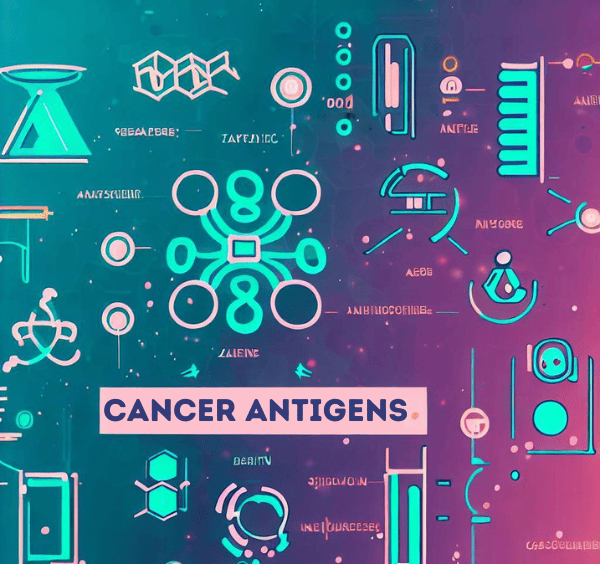
Antigens are large molecules, primarily proteins or polysaccharides, present on the surface of various agents such as bacteria, fungi, viruses, and other foreign particles. They instigate an immune response when they infiltrate the body, which often leads to the production of antibodies tailor-made to neutralize the perceived threat.
Cancer antigens are substances that are produced by cancer cells or by the body in response to cancer cells. These antigens are typically proteins or portions of proteins, and they can be found on the surface of cancer cells or in the blood, urine, or other body fluids of some people with cancer.
There are several types of cancer antigens:
- Tumor-Associated Antigens (TAAs): Proteins or parts of proteins that are present on the surface of both cancer cells and some normal cells that are overexpressed in cancer cells.
- Tumor-Specific Antigens (TSAs): Unique to cancer cells and not found on normal cells, they arise from mutations that occur during the transformation of a normal cell into a cancer cell.
- Oncofetal Antigens: Proteins that are typically only produced during fetal development but which can also be produced by certain types of cancer cells (e.g. alpha-fetoprotein and carcinoembryonic antigen).
- Viral Antigens: Some cancers are caused by viruses, and these cancers may produce viral proteins that can be targeted for treatment or used in diagnosis (e.g. human papillomavirus can cause cervical cancer).
- Cancer/Testis Antigens (CTAs): Proteins normally expressed only in the male germ cells of the testis (where the immune system is not active) but which can also be expressed in various types of tumors.
What Are Tumor Markers?
Tumor markers, also often referred to as biomarkers, are substances either produced by cancer cells or by the body in response to cancer. Several tumor markers have been identified and each is associated with particular types of cancers, including:
- Alpha-fetoprotein (AFP): Liver and germ cell tumors
- Cancer antigen 125 (CA125): Ovarian cancer
- Cancer antigen 15-3 (CA15-3): Breast cancer
- Carbohydrate antigen 19-9 (CA19-9): Pancreatic and gastrointestinal cancers
- Carcinoembryonic antigen (CEA): Colorectal and other cancers
- Human chorionic gonadotropin (hCG or beta-hCG): Germ cell and trophoblastic tumors
- Prostate-specific antigen (PSA): Prostate cancer
Tumor markers serve a range of purposes for clinicians, including screening, diagnosis, staging (determining the size and spread of cancer), prognosis, treatment guidance, and monitoring
However, some markers can be elevated in benign conditions or other non-cancerous diseases, and some individuals might have cancer that doesn't elevate the levels of the associated tumor marker. Also, some tumor markers are present in multiple cancer types, making it difficult to target a specific cancer, and not every cancer type has a known associated tumor marker.
Given those limitations, elevated tumor marker levels alone are not definitive proof of cancer. Other diagnostic tests and evaluations are necessary. For example, in the case of CA-125, levels can fluctuate and might not correlate directly with the extent of cancer present. Thus, a series of CA-125 tests are typically ordered to track changes over time.
Identifying Tumor Antigens
The majority of known tumor antigens are identified through comprehensive molecular characterization which reveals canonical tumor antigens derived from protein-coding regions of the genome. With advancements in biotechnology, newer methods have emerged in the area of antigen identification:
- Human Leukocyte Antigen (HLA) Elution: HLA-bound peptides are eluted from tumor samples, and these peptides, once subjected to mass spectrometry analysis, can be identified by comparing the resulting spectra against reference databases.
- Noncanonical Antigens: The advent of mass-spectrometry-based immunopeptidomics has facilitated the discovery of antigens derived from sequences outside protein-coding regions or generated through unconventional antigen-processing mechanisms.
- Transcriptomics and Ribosome Profiling: This combined approach allows the identification of thousands of noncanonical peptides. A significant fraction of these peptides might be exclusively found in tumors, expanding the potential targets for therapies.
The accurate identification of tumor antigens has several downstream implications, including personalized therapies that take into account an individual's specific tumor antigens. It may also pave the way for the creation of more effective cancer vaccines.
Common Questions
Does a positive test for cancer antigens mean a patient has cancer?
A positive test result, indicating elevated levels of a specific tumor marker, does not conclusively confirm the presence of cancer. Tumor markers can also be elevated in non-cancerous conditions such as endometriosis, liver disease, or even pregnancy.
What are cancer antigen numbers?
Cancer antigen numbers refer to a quantifiable measurement of specific proteins or markers in the blood. These numbers serve as identifiers, helping differentiate between the vast array of tumor markers used in diagnostics. The absolute number (or level) can vary significantly across individuals, and even in the same individual over time.
Can antigens be tumor markers?
While all tumor markers can be antigens, not all antigens act as tumor markers. Certain tumor antigens are targeted in cancer treatments, especially in immunotherapies where the immune system is directed to attack cancer cells based on these specific antigens.
Are tumor marker tests reliable for screening?
These tests can detect cancer early in some cases, especially in high-risk populations. However, they are not foolproof and can produce false positives and negatives. Due to their limitations, they are not typically used as universal screening tools but rather in conjunction with other diagnostic methods.
From Molecular Understanding to Better Patient Care
In the evolving field of oncology research, it's essential to approach diagnostic tools like tumor markers and antigens with an understanding of their strengths and limitations. Continuous research and advancements promise better clarity and precision and more effective cancer diagnosis and treatment.
LIDE delivers innovations in oncology translational research and immuno-oncology. Contact Global Vice President, Josh Caggiula today to learn more about our first-class research capabilities.